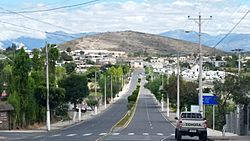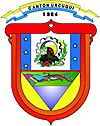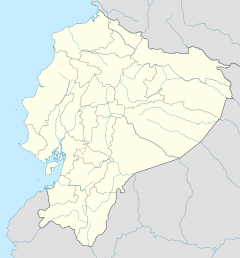Urcuquí facts for kids
Quick facts for kids
Urcuquí
|
||
|---|---|---|
|
Town
|
||
 |
||
|
||
| Ecuador | Ecuador | |
| Province | Imbabura | |
| Canton | San Miguel de Urcuquí | |
| Founded | February 9, 1984 | |
| Area | ||
| • Town | 2.96 km2 (1.14 sq mi) | |
| Elevation | 2,307 m (7,569 ft) | |
| Population
(2022 census)
|
||
| • Town | 4,480 | |
| • Density | 1,514/km2 (3,920/sq mi) | |
| Time zone | UTC-5 (ECT) | |
| Website | Official website: https://www.urcuqui.gob.ec/ | |
Urcuquí, also known as San Miguel de Urcuquí, is a town in northern Ecuador. It is the main town of the San Miguel de Urcuquí Canton in the Imbabura Province. The town is surrounded by other areas. To the north is Salinas parish in Ibarra. To the south are Imbaya, Chaltura, and Atuntaqui parishes. Imantag parish is also to the south. To the east is San Blas parish, and to the west is Ibarra canton.
Contents
History of Urcuquí
Urcuquí became a canton on February 9, 1984. This decision was made by the Legislative Commissions in Quito. The town of Urcuquí was chosen as the main center for the new canton. Mauro Francisco López was the first leader of the town's council. He had worked hard to make Urcuquí a canton.
What Does Urcuquí Mean?
The name Urcuquí comes from the past. Long ago, indigenous families called Ayllu lived here. One group, the Urcuquíes, gave the area its original name: URCUCIQUE. This name comes from two words in the Quichua language. URCU means hill, and CIQUE means seat. So, URCUCIQUE means "hill seat." Over time, the name changed to Urcuquí.
How Urcuquí Makes Money
The people of Urcuquí mainly work in agriculture and livestock. They grow many different crops. These include potatoes, corn, and beans. They also grow bananas, sugar cane, and papaya.
Farmers raise animals like cattle, pigs, and horses. They also raise sheep for wool. Some small businesses make dairy products from milk.
Images for kids
See also
 In Spanish: Urcuquí para niños
In Spanish: Urcuquí para niños
 | Emma Amos |
 | Edward Mitchell Bannister |
 | Larry D. Alexander |
 | Ernie Barnes |





